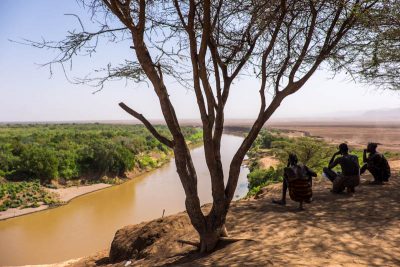Karo men overlooking the dwindling Omo River
and the vast cotton fields stretching to the horizon
By
Timothy Jay Smith
“Island! Island!” I thought the kids shouted running after our car, hands outstretched in the endless clouds of dust we kicked up, paved road or not. If countries selected a defining air quality, like they do birds and national anthems, in drought-prone Ethiopia, it would be ‘dusty’.
And it’s going to get dustier.
The country has always had a long dry season, usually nine months; but in the other three, enough rain fell to fill Ethiopia’s many rivers, replenish wells, and raise water tables high enough to keep the plants green that nourish, and quench the thirst of, the scrawny herds of cattle and goats on which the indigenous tribes survive. With global warming, that brief rainy season has already become noticeably shorter. Less XXX discussed is a new, even more insidious development that threatens traditional livelihoods, and promises to exacerbate a host of other national problems in addition to accelerating global warming.
The threat: corporate-led recolonization of vast tracts of Africa.
As we traveled to the remote and arid southern Omo Valley, we passed row after row of huge greenhouses covering thousands of hectares growing roses for export. Further along, tens of thousands of hectares that had been cleared of the pastoral bush on which local tribes survive, and replanted with cotton plantations. On the rough roads, we repeatedly passed trucks carrying enormous pieces of equipment destined for new sugar cane plantations; a total of ten to be built nationwide, six of which will require damming rivers for irrigation that currently provide water for survival to the tribal south.
All these crops are water-guzzlers, and even before all the dams have been built and additional hectares planted, the effects of less water are evident. Rivers that used to provide at least some water all year round are now stone dry; underground water tables have fallen; and the Rift Valley lakes, being tapped for growing roses, are receding. The implications for local populations are disastrous, but what is happening has implications for the world as a whole. Desertification of previously green areas contributes to global warming; toxic runoff from the plantation farms pollutes what water remains; and as people find it impossible to survive, they migrate to cities, creating new demands for services that poorer countries simply cannot provide.
Water is now rationed in Ethiopia’s capital. Addis Ababa, estimated at over six million people now compared to 3.4 million counted in the 2007 census. Some of the newer neighborhoods ringing the town get water only twice a month! In much of Addis, service is limited to two days a week. While that may sound desperate, in the countryside, every family spends hours each day, often traveling many miles and waiting in long lines, to fetch their daily water ration, which is sometimes no more than one full jerrycan holding under six gallons.
The culprits in this unfolding disaster, in Ethiopia as well as much of the developing world, are international corporations facilitated by abetting governments. In Ethiopia, leading the pack are investors from India, Saudi Arabia, China, Turkey, and the European Union, but it is a worldwide phenomenon that has escaped widespread scrutiny because it is led by companies, not foreign governments, which are promising jobs and prosperity without the messy business of occupation and colonization, though it largely amounts to the same thing. In the last fifteen years, some 37 million hectares in the poorest countries (twice the size of Germany) have been leased to corporations for up to one hundred years at the expense of the most vulnerable people in the world.
Unfortunately, the international agencies that might have slowed or stopped some of these ill-conceived projects have instead largely condoned them, ballyhooing the benefits of new jobs, and writing sham reports assuring that tribal leaders (at least in Ethiopia) will be included in the development process. It begs the question of how illiterate nomads clueless about the modern world can engage in a meaningful dialogue to protect their heritage and members. Promises to swap land-for-land are equally empty, when historical grazing areas straggling desert rivers are stripped clear of native vegetation for the new plantations, pushing the tribes into the even drier and unsustainable hinterlands.
Ethiopia only had to look next door to Kenya for an example of what will happen. One of Africa’s original roses-for-export industries, centered around Lake Naivasha, transformed the local culture into a menial workforce, polluted the water, and resulted in large-scale urban migration to Nairobi, another capital city unprepared to deliver essential services to a rapidly expanding population.
Perhaps the saddest thing about the Ethiopian case is that its Omo Valley is home to some of the last truly indigenous tribal people in the world. Twenty-some tribes are at risk. A handful of larger ones will endure in some form, but potentially, in a single generation, many smaller tribes representing a viable part of ancient human heritage will be irrevocably corrupted or lost forever.
About that “Island! Island!” the children begged for in our retreating clouds of dust? They were crying “Highland! Highland!”– a holdover from Highland Springs, the first water bottling plant in Ethiopia. It has since closed, but the need for water, especially fresh water, is greater than ever.
“Highland! Highland!”
It could be Ethiopia’s new national slogan.



No Comments Yet!
You can be first to comment this post!